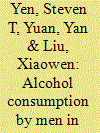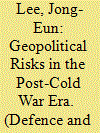| Srl | Item |
| 1 |
ID:
089551


|
|
|
|
|
| Publication |
2009.
|
| Summary/Abstract |
Consumption of beer, wine and spirits by men in China is investigated, using data from the 2006 China Health and Nutrition Survey. Censoring of consumption levels is accommodated by estimating a censored equation system, using quasi maximum-likelihood and copula methods which allow the specification of non-Gaussian error distributions. Findings suggest that a misspecified error distribution can obscure the effects of explanatory variables on alcohol consumption. The procedure produces very different empirical estimates from a more conventional (Gaussian) estimator. Income does not affect alcohol consumption, with socio-demographic factors such as education, employment, and marital status playing more definitive roles. Regional differences are also found.
|
|
|
|
|
|
|
|
|
|
|
|
|
|
|
|
| 2 |
ID:
100260


|
|
|
|
|
| Publication |
2010.
|
| Summary/Abstract |
It is commonly argued that China's financial markets are effectively insulated from the rest of the world. To see if this is true, and to better understand China's financial development, we analyse China's integration with major financial markets. Using conditional copulas, we show that China has experienced an increasing level of integration with several major financial markets during the last decade, albeit at a slow pace and from very low levels. Furthermore, the level of integration has increased with several major markets during the global financial crisis. The results and possible reasons for the increasing integration are analysed and the implications for policymakers and market participants are discussed.
|
|
|
|
|
|
|
|
|
|
|
|
|
|
|
|
| 3 |
ID:
174616


|
|
|
|
|
| Summary/Abstract |
This study explores the post-Cold War era by investigating geopolitical risks (GPRs) from the Middle East to the Korean Peninsula. Geopolitics is a fleeting reality and is a matter of a few top decision makers while ordinary people catch a glimpse of it by the press. Due to the relative inaccessibility of key information, geopolitics is hard to study even if it is a crucial element to shape our era. To fill the gap, we adopt a copula approach to surmise a joint probability distribution between the GPR in the world and several countries. This method could capture tail dependence. The highest upper tail dependence with the world’s GPR has been that of Israel; as one moves from the Cold War to the post-Cold War period, the increasing cases of upper tail dependence are China, Korea, Russia, and Ukraine while decreasing cases are Israel, Saudi Arabia, and Turkey. It implies that the world’s flashpoints might have been shifting from the Middle East to Asia as our eras have gone through the Cold War and the post-Cold War periods. Seemingly self-centered Make America Great Again could be Make the World Great Again. The best is yet to come.
|
|
|
|
|
|
|
|
|
|
|
|
|
|
|
|